英语八级汉英翻译讲座内容--苏东坡
【精品】英语介绍三苏祠苏轼
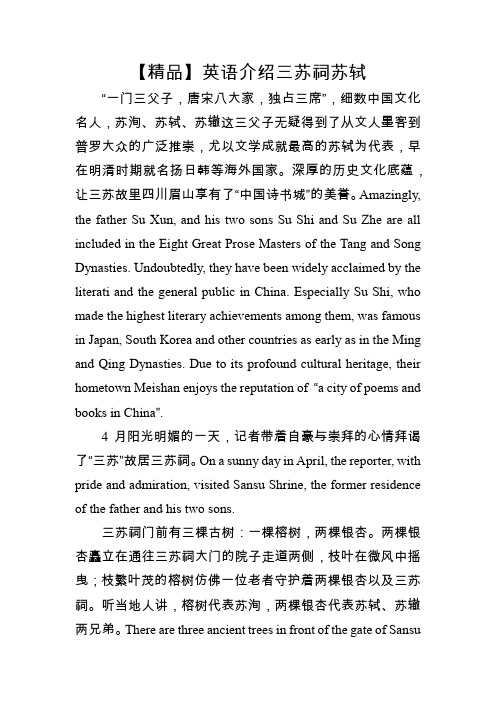
【精品】英语介绍三苏祠苏轼“一门三父子,唐宋八大家,独占三席”,细数中国文化名人,苏洵、苏轼、苏辙这三父子无疑得到了从文人墨客到普罗大众的广泛推崇,尤以文学成就最高的苏轼为代表,早在明清时期就名扬日韩等海外国家。
深厚的历史文化底蕴,让三苏故里四川眉山享有了“中国诗书城”的美誉。
Amazingly, the father Su Xun, and his two sons Su Shi and Su Zhe are all included in the Eight Great Prose Masters of the Tang and Song Dynasties. Undoubtedly, they have been widely acclaimed by the literati and the general public in China. Especially Su Shi, who made the highest literary achievements among them, was famous in Japan, South Korea and other countries as early as in the Ming and Qing Dynasties. Due to its profound cultural heritage, their hometown Meishan enjoys the reputation of “a city of poems and books in China”.4月阳光明媚的一天,记者带着自豪与崇拜的心情拜谒了“三苏”故居三苏祠。
On a sunny day in April, the reporter, with pride and admiration, visited Sansu Shrine, the former residence of the father and his two sons.三苏祠门前有三棵古树:一棵榕树,两棵银杏。
关于苏轼的英语演讲

ACHIEVEMENT
Because of Su's talent, Su was envied and was relegated to Huangzhou, a poor place. Even when Su was there, he didn't lose his spirit for the life. What's more, his poems created at that time was even better. Su's time has past, but his spirit lives forever.
ACHIEVEMENT
In Chinese history, Su Shi, together with his brother Su Zhe and father Su Xun, were all famous and were called Three Sus. But Su Shi's contribution was the greatest. He not only created wonderful works, but also did many good things for common people when he was an officer. Today, there is still a Su Bank in Hangzhou Province.
行业PPT模板:/hangye/ PPT素材下载:/sucai/ PPT图表下载:/tubiao/ PPT教程: /powerpoint/ Excel教程:/excel/ PPT课件下载:/kejian/ 试卷下载:/shiti/
PPT模板下载:/moban/ 节日PPT模板:/jieri/ PPT背景图片:/beijing/ 优秀PPT下载:/xiazai/ Word教程: /word/ 资料下载:/ziliao/ 范文下载:/fanwen/ 教案下载:/jiaoad and living dim and draw apart . I don't try to remember, But forgetting is hard.Lonely grave a thousand miles off,Cold thoughts, where can I talk them out?Even if we met, you wouldn't know me,Dust on my face,Hair like frost.
认识苏东坡英语演讲稿范文
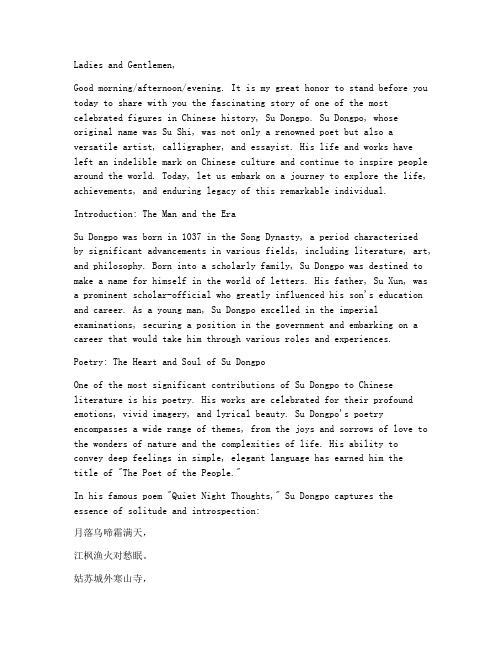
Ladies and Gentlemen,Good morning/afternoon/evening. It is my great honor to stand before you today to share with you the fascinating story of one of the most celebrated figures in Chinese history, Su Dongpo. Su Dongpo, whose original name was Su Shi, was not only a renowned poet but also a versatile artist, calligrapher, and essayist. His life and works haveleft an indelible mark on Chinese culture and continue to inspire people around the world. Today, let us embark on a journey to explore the life, achievements, and enduring legacy of this remarkable individual.Introduction: The Man and the EraSu Dongpo was born in 1037 in the Song Dynasty, a period characterizedby significant advancements in various fields, including literature, art, and philosophy. Born into a scholarly family, Su Dongpo was destined to make a name for himself in the world of letters. His father, Su Xun, was a prominent scholar-official who greatly influenced his son's education and career. As a young man, Su Dongpo excelled in the imperial examinations, securing a position in the government and embarking on a career that would take him through various roles and experiences.Poetry: The Heart and Soul of Su DongpoOne of the most significant contributions of Su Dongpo to Chinese literature is his poetry. His works are celebrated for their profound emotions, vivid imagery, and lyrical beauty. Su Dongpo's poetry encompasses a wide range of themes, from the joys and sorrows of love to the wonders of nature and the complexities of life. His ability to convey deep feelings in simple, elegant language has earned him thetitle of "The Poet of the People."In his famous poem "Quiet Night Thoughts," Su Dongpo captures the essence of solitude and introspection:月落乌啼霜满天,江枫渔火对愁眠。
关于苏轼的历史地点演讲稿一分钟英语
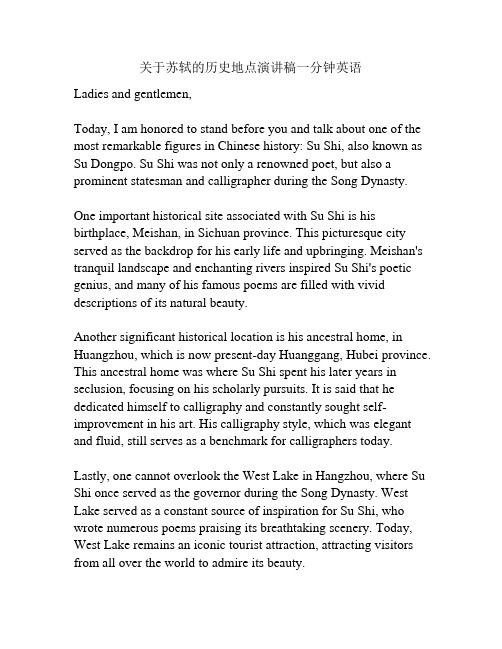
关于苏轼的历史地点演讲稿一分钟英语Ladies and gentlemen,Today, I am honored to stand before you and talk about one of the most remarkable figures in Chinese history: Su Shi, also known as Su Dongpo. Su Shi was not only a renowned poet, but also a prominent statesman and calligrapher during the Song Dynasty.One important historical site associated with Su Shi is his birthplace, Meishan, in Sichuan province. This picturesque city served as the backdrop for his early life and upbringing. Meishan's tranquil landscape and enchanting rivers inspired Su Shi's poetic genius, and many of his famous poems are filled with vivid descriptions of its natural beauty.Another significant historical location is his ancestral home, in Huangzhou, which is now present-day Huanggang, Hubei province. This ancestral home was where Su Shi spent his later years in seclusion, focusing on his scholarly pursuits. It is said that he dedicated himself to calligraphy and constantly sought self-improvement in his art. His calligraphy style, which was elegant and fluid, still serves as a benchmark for calligraphers today. Lastly, one cannot overlook the West Lake in Hangzhou, where Su Shi once served as the governor during the Song Dynasty. West Lake served as a constant source of inspiration for Su Shi, who wrote numerous poems praising its breathtaking scenery. Today, West Lake remains an iconic tourist attraction, attracting visitors from all over the world to admire its beauty.In conclusion, Su Shi left an indelible mark on Chinese history as a talented poet, statesman, and calligrapher. His work and legacy continue to be celebrated today, not only in the historical sites associated with him but also in the hearts of those who appreciate his art. Let us remember Su Shi, an exceptional figure whose contributions still resonate with us today.Thank you.。
2020年英语专业8级翻译系列:汉译英--文学类1完整篇.doc
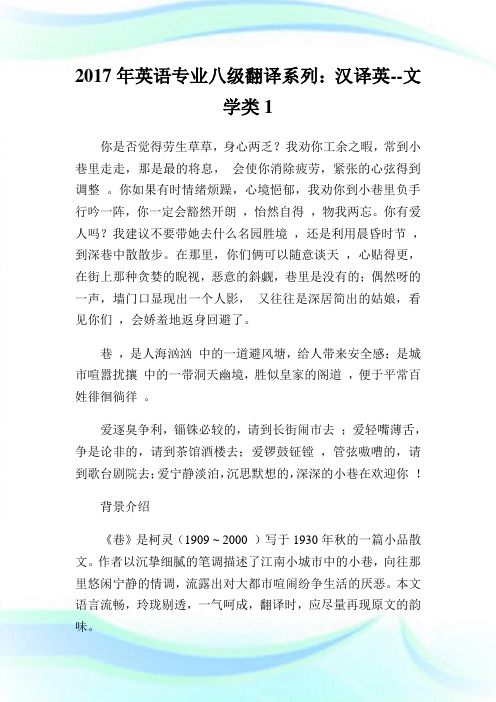
2017年英语专业八级翻译系列:汉译英--文学类1你是否觉得劳生草草,身心两乏?我劝你工余之暇,常到小巷里走走,那是最的将息,会使你消除疲劳,紧张的心弦得到调整。
你如果有时情绪烦躁,心境悒郁,我劝你到小巷里负手行吟一阵,你一定会豁然开朗,怡然自得,物我两忘。
你有爱人吗?我建议不要带她去什么名园胜境,还是利用晨昏时节,到深巷中散散步。
在那里,你们俩可以随意谈天,心贴得更,在街上那种贪婪的睨视,恶意的斜觑,巷里是没有的;偶然呀的一声,墙门口显现出一个人影,又往往是深居简出的姑娘,看见你们,会娇羞地返身回避了。
巷,是人海汹汹中的一道避风塘,给人带来安全感;是城市喧嚣扰攘中的一带洞天幽境,胜似皇家的阁道,便于平常百姓徘徊徜徉。
爱逐臭争利,锱铢必较的,请到长街闹市去;爱轻嘴薄舌,争是论非的,请到茶馆酒楼去;爱锣鼓钲镗,管弦嗷嘈的,请到歌台剧院去;爱宁静淡泊,沉思默想的,深深的小巷在欢迎你!背景介绍《巷》是柯灵(1909 ~ 2000 )写于1930年秋的一篇小品散文。
作者以沉挚细腻的笔调描述了江南小城市中的小巷,向往那里悠闲宁静的情调,流露出对大都市喧闹纷争生活的厌恶。
本文语言流畅,玲珑剔透,一气呵成,翻译时,应尽量再现原文的韵味。
难点解析1. 你是否觉得劳生草草:“劳生”作“辛劳的生活”解;“草草”作“忧虑”解。
全句可译为“Aren ’t you weighed down with cares in this life of hard toil...”。
weigh sb. down: depress; make tired, troubled, etc. (使闷闷不乐;使某人困乏、担心、忧虑等)。
例如,weighed down with sorrow / anxieties(因忧伤/焦虑而闷闷不乐)。
2. 身心两乏:意为“身体上和心理上都感到困乏”。
故可译为“exhausted physically and mentally”或“exhausted both in body and mind”。
介绍苏轼英语演讲稿范文
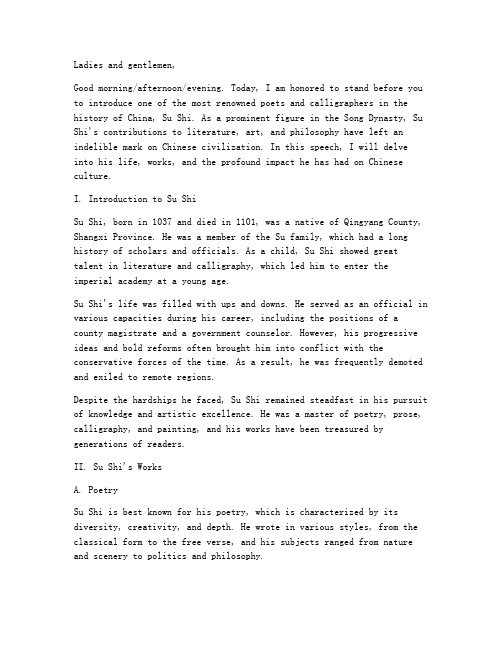
Ladies and gentlemen,Good morning/afternoon/evening. Today, I am honored to stand before you to introduce one of the most renowned poets and calligraphers in the history of China, Su Shi. As a prominent figure in the Song Dynasty, Su Shi's contributions to literature, art, and philosophy have left an indelible mark on Chinese civilization. In this speech, I will delveinto his life, works, and the profound impact he has had on Chinese culture.I. Introduction to Su ShiSu Shi, born in 1037 and died in 1101, was a native of Qingyang County, Shangxi Province. He was a member of the Su family, which had a long history of scholars and officials. As a child, Su Shi showed greattalent in literature and calligraphy, which led him to enter theimperial academy at a young age.Su Shi's life was filled with ups and downs. He served as an official in various capacities during his career, including the positions of a county magistrate and a government counselor. However, his progressive ideas and bold reforms often brought him into conflict with the conservative forces of the time. As a result, he was frequently demoted and exiled to remote regions.Despite the hardships he faced, Su Shi remained steadfast in his pursuit of knowledge and artistic excellence. He was a master of poetry, prose, calligraphy, and painting, and his works have been treasured by generations of readers.II. Su Shi's WorksA. PoetrySu Shi is best known for his poetry, which is characterized by its diversity, creativity, and depth. He wrote in various styles, from the classical form to the free verse, and his subjects ranged from nature and scenery to politics and philosophy.His poetry reflects his diverse experiences in life. In his early works, he celebrated the beauty of nature and the joys of friendship. In his later works, he expressed his disillusionment with the political world and his longing for peace and simplicity.B. ProseIn addition to poetry, Su Shi was also a master of prose. His essays and letters are known for their wit, elegance, and philosophical insights. He wrote about a wide range of topics, from the nature of art to the importance of friendship.C. Calligraphy and PaintingSu Shi was also a renowned calligrapher and painter. His calligraphy is known for its bold and expressive strokes, while his paintings often depict landscapes and flowers. He believed that calligraphy and painting were not just artistic endeavors but also a means to express one's inner world.III. Su Shi's Impact on Chinese CultureA. PoetrySu Shi's poetry has had a profound impact on Chinese literature. His works have inspired countless poets and writers throughout history. His innovative techniques and themes have been studied and emulated by many.B. Calligraphy and PaintingSu Shi's contributions to calligraphy and painting have also had alasting influence on Chinese art. His unique style has been emulated by countless calligraphers and painters, and his works continue to be revered today.C. PhilosophySu Shi's philosophy has also had a significant impact on Chinese thought. He believed in the importance of self-cultivation and the pursuit of inner peace. His ideas have been studied and discussed by scholars and philosophers for centuries.IV. ConclusionIn conclusion, Su Shi was a multifaceted genius whose contributions to Chinese culture have been immense. His poetry, prose, calligraphy, and painting have left an indelible mark on Chinese civilization. His works continue to inspire and delight readers around the world.As we reflect on Su Shi's life and achievements, we are reminded of the power of creativity and the importance of perseverance. His legacy serves as a testament to the enduring value of art and the pursuit of knowledge.Thank you for your attention.。
苏轼一生介绍英语作文
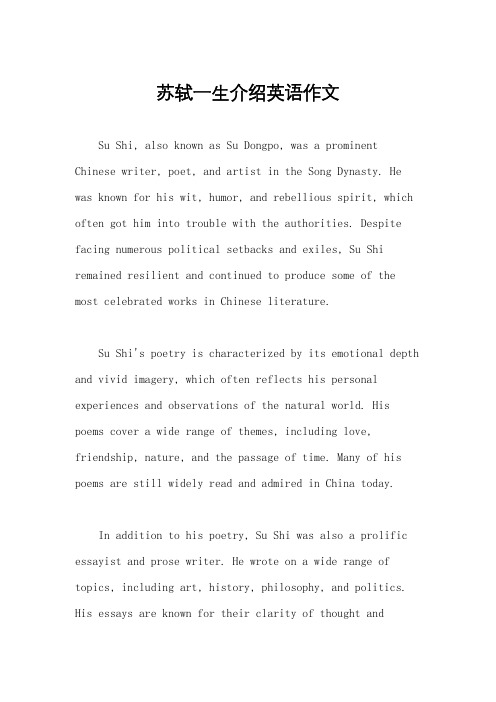
苏轼一生介绍英语作文Su Shi, also known as Su Dongpo, was a prominent Chinese writer, poet, and artist in the Song Dynasty. He was known for his wit, humor, and rebellious spirit, which often got him into trouble with the authorities. Despite facing numerous political setbacks and exiles, Su Shi remained resilient and continued to produce some of the most celebrated works in Chinese literature.Su Shi's poetry is characterized by its emotional depth and vivid imagery, which often reflects his personal experiences and observations of the natural world. His poems cover a wide range of themes, including love, friendship, nature, and the passage of time. Many of his poems are still widely read and admired in China today.In addition to his poetry, Su Shi was also a prolific essayist and prose writer. He wrote on a wide range of topics, including art, history, philosophy, and politics. His essays are known for their clarity of thought andelegant prose style, which have earned him a reputation as one of the greatest prose writers in Chinese literary history.Su Shi's artistic talents were not limited to writing. He was also a skilled calligrapher and painter, and his works in these mediums are highly regarded for their expressive brushwork and innovative techniques. His calligraphy, in particular, is considered to be among the finest in Chinese art history.Despite his enduring legacy, Su Shi's life was not without hardship. He was frequently at odds with the ruling authorities due to his outspoken views and was exiled multiple times as a result. However, he never wavered in his commitment to his principles and continued to produce influential works throughout his life.Su Shi's influence on Chinese literature and culture cannot be overstated. His writings and artistic achievements have left an indelible mark on the literary and artistic traditions of China, and his legacy continuesto inspire and captivate readers and scholars around the world.。
英语世界的苏轼《水调歌头·明月几时有》译介研究
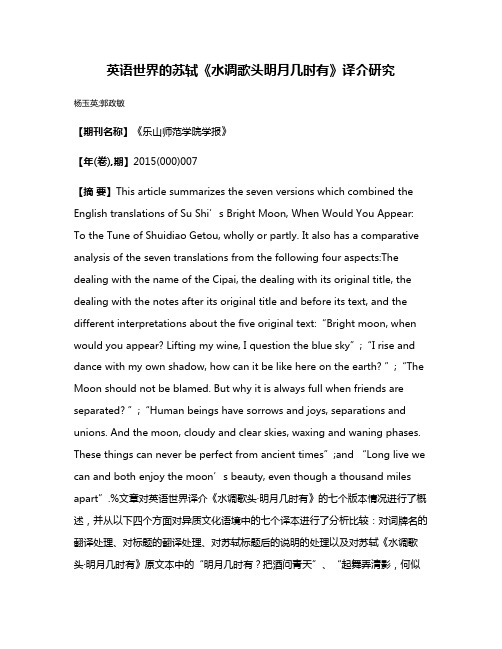
英语世界的苏轼《水调歌头明月几时有》译介研究杨玉英;郭政敏【期刊名称】《乐山师范学院学报》【年(卷),期】2015(000)007【摘要】This article summarizes the seven versions which combined the English translations of Su Shi’s Bright Moon, When Would You Appear: To the Tune of Shuidiao Getou, wholly or partly. It also has a comparative analysis of the seven translations from the following four aspects:The dealing with the name of the Cipai, the dealing with its original title, the dealing with the notes after its original title and before its text, and the diffe rent interpretations about the five original text:“Bright moon, when would you appear? Lifting my wine, I question the blue sky”;“I rise and dance with my own shadow, how can it be like here on the earth? ”;“The Moon should not be blamed. But why it is always full when friends are separated? ”;“Human beings have sorrows and joys, separations and unions. And the moon, cloudy and clear skies, waxing and waning phases. These things can never be perfect from ancient times”;and “Long live we can and both enjoy t he moon’s beauty, even though a thousand miles apart”.%文章对英语世界译介《水调歌头·明月几时有》的七个版本情况进行了概述,并从以下四个方面对异质文化语境中的七个译本进行了分析比较:对词牌名的翻译处理、对标题的翻译处理、对苏轼标题后的说明的处理以及对苏轼《水调歌头·明月几时有》原文本中的“明月几时有?把酒问青天”、“起舞弄清影,何似在人间”、“不应有恨,何事长向别时圆”、“人有悲欢离合,月有阴晴圆缺,此事古难全”和“但愿人长久,千里共婵娟”等五处的解读。
关于苏轼的英语演讲

关于苏轼的英语演讲Ladies and gentlemen。
Good morning. Today, I am honored to stand before you and deliver a speech on one of the most influential figures in Chinese history, Su Shi, also known as Su Dongpo. Su Shi was not only a renowned poet, writer, calligrapher, and painter of the Song Dynasty, but also a political activist and one of the most beloved characters in Chinese literature。
Su Shi was born in 1037 in Meishan, Sichuan Province. He came from a distinguished family, with his father being a prominent government official. From a young age, Su Shi showed exceptional intelligence and talent, excelling in various fields of study. His passion for poetry and literature began to flourish during his teenage years。
Su Shi's poetry is characterized by its emotional depth, natural imagery, and profound philosophical insights. His works often reflecthis personal experiences, from his joy and love for life to his frustrations and sorrows. One of his most famous poems, "Red Cliff", vividly depicts a scene of a battle and reflects on the transient nature of life。
苏轼的人生经历英文版
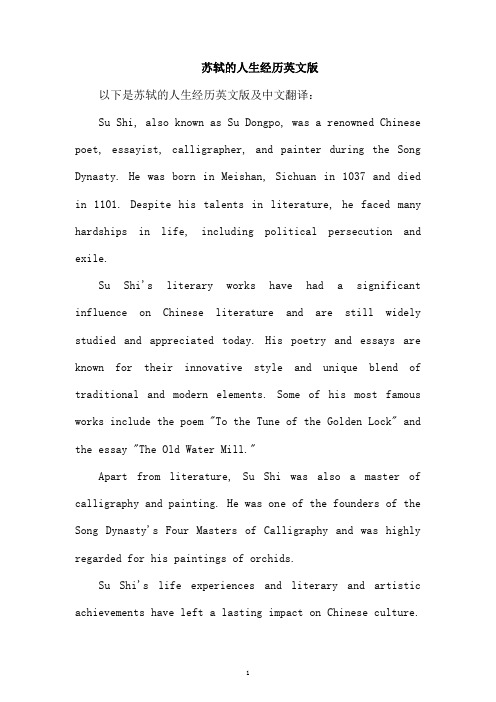
苏轼的人生经历英文版以下是苏轼的人生经历英文版及中文翻译:Su Shi, also known as Su Dongpo, was a renowned Chinese poet, essayist, calligrapher, and painter during the Song Dynasty. He was born in Meishan, Sichuan in 1037 and died in 1101. Despite his talents in literature, he faced many hardships in life, including political persecution and exile.Su Shi's literary works have had a significant influence on Chinese literature and are still widely studied and appreciated today. His poetry and essays are known for their innovative style and unique blend of traditional and modern elements. Some of his most famous works include the poem "To the Tune of the Golden Lock" and the essay "The Old Water Mill."Apart from literature, Su Shi was also a master of calligraphy and painting. He was one of the founders of the Song Dynasty's Four Masters of Calligraphy and was highly regarded for his paintings of orchids.Su Shi's life experiences and literary and artistic achievements have left a lasting impact on Chinese culture.Despite the many hardships he faced, he continued to create and inspire others through his talents.翻译:苏轼(1037年-1101年),字子瞻,号东坡居士,四川眉山人。
有关苏轼的英文介绍带翻译

Su Shi was also a master of ci, a form of Chinese lyric poetry. His ci poems are known for their musical and rhythmic qualities, often accompanied by musical compositions. His ci works, such as "The Midnight Rhapsody" and "Nostalgia at Maple Bridge," are considered masterpieces of the genre.
3. Prose:
Apart from poetry, Su Shi's prose writings were equally influential. His essays and prose works covered a wide range of topics, including politics, history, and social criticism. Notably, his travel diaries, such as "Record of Stone Bell Mountain" and "Dongpo's Story," provide valuable insights into the customs and landscapes of ancient China.
IV. and Legacy:
Su Shi's impact on Chinese literature and culture cannot be overstated. His poetry and prose writings continue to be studied and admired by scholars and enthusiasts worldwide. Furthermore, Su Shi's philosophy of embracing the beauty of life, appreciating nature, and advocating for social justice resonates with people even today. He is revered as a cultural icon and remains a source of inspiration for many aspiring writers and artists.
介绍苏轼成就的英语作文
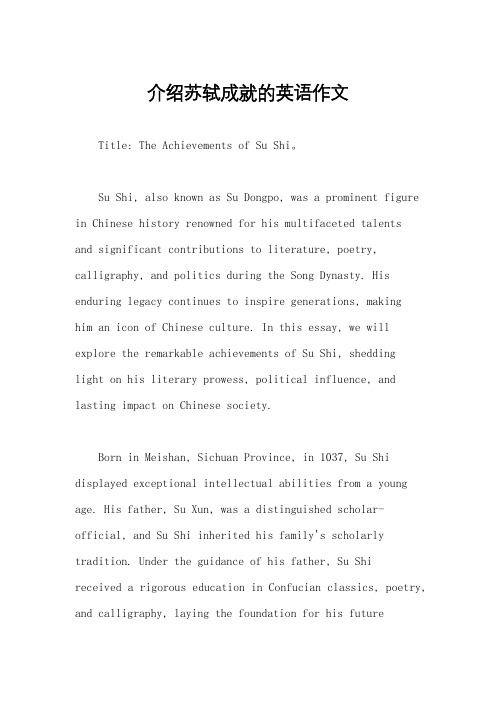
介绍苏轼成就的英语作文Title: The Achievements of Su Shi。
Su Shi, also known as Su Dongpo, was a prominent figure in Chinese history renowned for his multifaceted talentsand significant contributions to literature, poetry, calligraphy, and politics during the Song Dynasty. His enduring legacy continues to inspire generations, makinghim an icon of Chinese culture. In this essay, we will explore the remarkable achievements of Su Shi, sheddinglight on his literary prowess, political influence, and lasting impact on Chinese society.Born in Meishan, Sichuan Province, in 1037, Su Shi displayed exceptional intellectual abilities from a young age. His father, Su Xun, was a distinguished scholar-official, and Su Shi inherited his family's scholarly tradition. Under the guidance of his father, Su Shireceived a rigorous education in Confucian classics, poetry, and calligraphy, laying the foundation for his futureaccomplishments.Su Shi's literary genius manifested itself early in his life. He excelled in various forms of poetry, including ci (lyric poetry) and shi (regulated verse), demonstrating a profound understanding of rhythm, imagery, and emotion. His poetic works, characterized by their elegance, depth, and versatility, earned him widespread acclaim and established him as one of the greatest poets of the Song Dynasty. Su Shi's poetry reflects the beauty of nature, the complexities of human emotions, and the transient nature of life, captivating readers with its timeless appeal.In addition to his poetry, Su Shi was also a prolific prose writer. His essays, letters, and prose poems are celebrated for their clarity, wit, and insight into various aspects of life. Su Shi's prose often delves into philosophical reflections, social criticism, and personal experiences, offering valuable perspectives on society and human nature. His most famous prose work, "Dongpo Zhilin" (The Record of the Stone Hut), is a collection of essays written during his exile, showcasing his resilience, humor,and profound observations on life's trials and tribulations.Beyond his literary achievements, Su Shi was actively involved in politics and served in various government positions throughout his career. Despite facing numerous political setbacks and periods of exile due to his outspokenness and criticism of government policies, Su Shi remained committed to his principles and never wavered inhis dedication to serving the people. His unwavering integrity, coupled with his intellectual prowess, earnedhim the respect and admiration of his contemporaries, cementing his reputation as a statesman of great moral character.Su Shi's influence extended beyond the literary and political spheres to encompass art and culture. As a master calligrapher, he developed his own distinctive style characterized by bold, expressive brushwork and graceful composition. His calligraphy, revered for its elegance and fluidity, continues to inspire artists and calligraphers to this day. Additionally, Su Shi's patronage of the arts and support for cultural activities contributed to theflourishing of literature, art, and scholarship during the Song Dynasty, leaving an indelible mark on Chinese cultural history.In conclusion, Su Shi's achievements are a testament to his unparalleled talent, intellect, and moral courage. As a poet, prose writer, calligrapher, and statesman, he left an enduring legacy that continues to resonate with people across generations. His contributions to literature, politics, and culture have enriched Chinese society and inspired countless individuals around the world. Su Shi's life and works serve as a timeless reminder of the power of creativity, wisdom, and integrity in shaping the course of history.。
苏东坡给人的启示英语作文
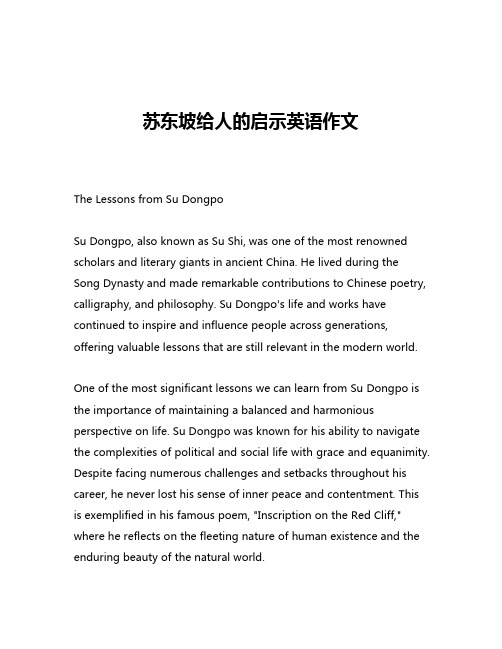
苏东坡给人的启示英语作文The Lessons from Su DongpoSu Dongpo, also known as Su Shi, was one of the most renowned scholars and literary giants in ancient China. He lived during the Song Dynasty and made remarkable contributions to Chinese poetry, calligraphy, and philosophy. Su Dongpo's life and works have continued to inspire and influence people across generations, offering valuable lessons that are still relevant in the modern world.One of the most significant lessons we can learn from Su Dongpo is the importance of maintaining a balanced and harmonious perspective on life. Su Dongpo was known for his ability to navigate the complexities of political and social life with grace and equanimity. Despite facing numerous challenges and setbacks throughout his career, he never lost his sense of inner peace and contentment. This is exemplified in his famous poem, "Inscription on the Red Cliff," where he reflects on the fleeting nature of human existence and the enduring beauty of the natural world.Su Dongpo's ability to find joy and meaning in the face of adversity is a testament to his deep understanding of the human condition. He recognized that life is a constant interplay of ups and downs, successes and failures, and that the true measure of a person's character lies in how they respond to these challenges. Rather than succumbing to despair or bitterness, Su Dongpo embraced the ebb and flow of life with a spirit of resilience and acceptance.Another crucial lesson we can take from Su Dongpo is the value of cultivating a multifaceted and well-rounded intellect. As a scholar, he excelled in a wide range of disciplines, from poetry and calligraphy to philosophy and statecraft. This breadth of knowledge and expertise allowed him to engage with complex issues from multiple perspectives, and to offer unique and insightful solutions to the problems of his time.In an era when specialization and narrow expertise are often prized, Su Dongpo's example reminds us of the importance of maintaining a curious and open-minded approach to learning. By embracing a diverse range of interests and disciplines, we can develop a more nuanced and holistic understanding of the world around us, and become better equipped to navigate the challenges of modern life.Perhaps one of the most enduring lessons from Su Dongpo's life is the power of self-reflection and personal growth. Despite his manyachievements and accolades, he remained deeply committed to the process of self-examination and personal improvement. He was not afraid to confront his own flaws and shortcomings, and to use this self-awareness as a springboard for growth and transformation.This commitment to personal growth is particularly relevant in today's fast-paced and often superficial world, where many people are quick to seek external validation and success without taking the time to cultivate their inner lives. Su Dongpo's example reminds us that true fulfillment and happiness can only be found through a deep and ongoing process of self-discovery and self-improvement.Furthermore, Su Dongpo's legacy also underscores the importance of maintaining a strong moral compass and a commitment to ethical conduct. Despite the political and social pressures he faced, he remained steadfast in his principles and refused to compromise his integrity. He was willing to speak truth to power and to stand up for what he believed was right, even at the risk of personal consequences.In a world that often rewards ruthless ambition and moral compromise, Su Dongpo's example serves as a powerful reminder of the enduring value of ethical leadership and moral courage. By emulating his commitment to principles and his willingness to challenge injustice, we can strive to build a more just and equitablesociety.Finally, Su Dongpo's legacy also highlights the enduring power of creativity and artistic expression. As a master of poetry, calligraphy, and painting, he left an indelible mark on the cultural landscape of China, inspiring generations of artists and thinkers. His works are not only aesthetically beautiful, but also deeply philosophical, exploring the complexities of human experience and the mysteries of the natural world.In an age where technology and mass media often dominate our cultural landscape, Su Dongpo's example reminds us of the importance of cultivating a rich and vibrant artistic tradition. By engaging with the arts, we can not only find personal fulfillment and joy, but also deepen our understanding of the human condition and our place in the world.In conclusion, the life and works of Su Dongpo offer a wealth of valuable lessons that are as relevant today as they were in his own time. From the importance of maintaining a balanced and harmonious perspective on life, to the value of cultivating a multifaceted intellect and a strong moral compass, Su Dongpo's example continues to inspire and guide us. By drawing inspiration from his legacy, we can strive to become more resilient, ethical, andcreative individuals, better equipped to navigate the complexities of the modern world.。
苏轼历史人物传记英语作文
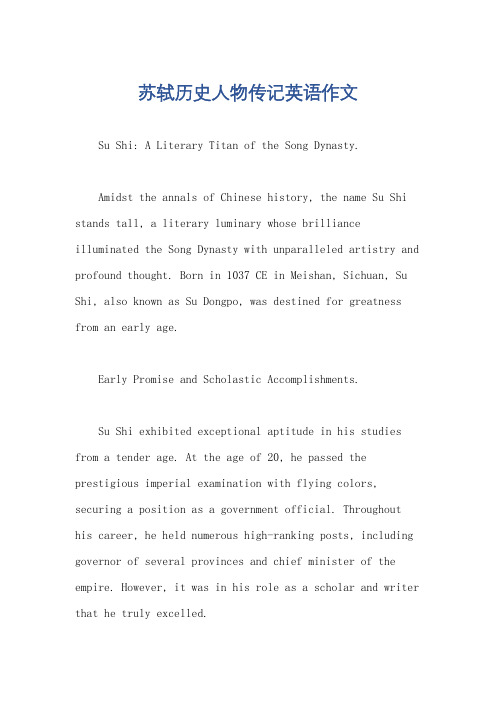
苏轼历史人物传记英语作文Su Shi: A Literary Titan of the Song Dynasty.Amidst the annals of Chinese history, the name Su Shi stands tall, a literary luminary whose brilliance illuminated the Song Dynasty with unparalleled artistry and profound thought. Born in 1037 CE in Meishan, Sichuan, Su Shi, also known as Su Dongpo, was destined for greatness from an early age.Early Promise and Scholastic Accomplishments.Su Shi exhibited exceptional aptitude in his studies from a tender age. At the age of 20, he passed the prestigious imperial examination with flying colors, securing a position as a government official. Throughout his career, he held numerous high-ranking posts, including governor of several provinces and chief minister of the empire. However, it was in his role as a scholar and writer that he truly excelled.Master of Poetry and Prose.Su Shi's literary prowess was evident from his youth. His poems, imbued with a keen sense of observation and a profound understanding of human nature, captured the hearts of readers and critics alike. He is renowned for hismastery of the ci poetic form, which he elevated to unprecedented heights with his innovative use of colloquial language and everyday imagery.Su Shi's prose was equally celebrated for its eloquence and wit. His essays, infused with satire, social commentary, and personal reflections, provide a fascinating glimpseinto the intellectual and social landscape of his time. His most famous work, "Ode to the Red Cliff," is a masterpieceof descriptive writing that vividly captures the grandeur and beauty of the natural world.Philosophical Musings and Buddhist Influence.Beyond his literary achievements, Su Shi was also aprofound philosopher. He embraced a syncretic approach, drawing inspiration from Confucianism, Taoism, and Buddhism. His writings often explored the nature of life, the transience of existence, and the search for meaning in an uncertain world.The influence of Buddhism in particular is evident inSu Shi's philosophical musings. He believed in the impermanence of all things and sought solace in the teachings of reincarnation and enlightenment. His writings often delve into the concept of karma and the interconnectedness of all living beings.Political Ups and Downs.Su Shi's brilliant mind and outspoken nature often brought him into conflict with the political establishment. His outspoken criticism of the emperor's policies and the corruption rampant in the court led to his dismissal from office and banishment to distant regions. However, despite these setbacks, Su Shi never lost his spirit or his commitment to truth and justice.Legacy and Influence.Su Shi's legacy as a literary giant is firmly established. His poems, prose, and philosophical writings have inspired generations of Chinese readers and continue to be celebrated today. His creative innovations and groundbreaking use of language have left an indelible mark on the development of Chinese literature.Beyond his literary contributions, Su Shi is also remembered as a courageous and principled individual. His willingness to stand up for his beliefs, even at great personal cost, earned him the respect of his contemporaries and posterity alike. He remains a symbol of integrity, intellectual freedom, and the indomitable spirit that can overcome adversity.Conclusion.Su Shi, the literary titan of the Song Dynasty, was a multifaceted genius whose brilliance spanned poetry, prose,philosophy, and political thought. His works, imbued with profound insight, masterful artistry, and an unwavering commitment to truth, have cemented his place in the pantheon of Chinese cultural giants. As the centuries pass, Su Shi's legacy continues to illuminate the literary landscape, inspiring and enchanting readers with his timeless words.。
学习苏东坡精神的英语作文
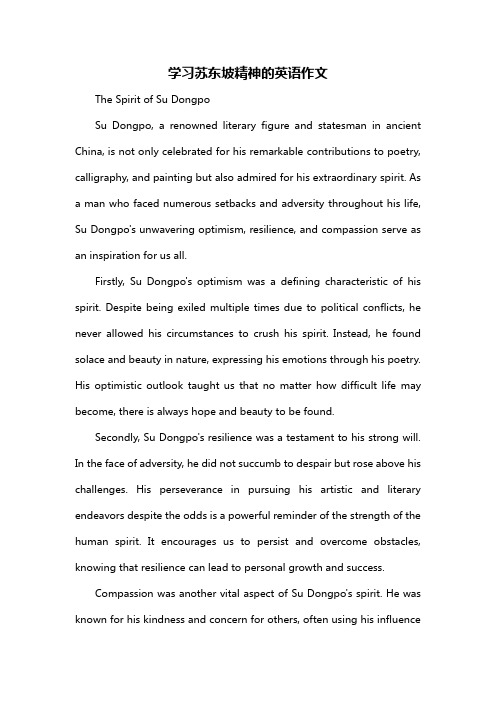
学习苏东坡精神的英语作文The Spirit of Su DongpoSu Dongpo, a renowned literary figure and statesman in ancient China, is not only celebrated for his remarkable contributions to poetry, calligraphy, and painting but also admired for his extraordinary spirit. As a man who faced numerous setbacks and adversity throughout his life, Su Dongpo's unwavering optimism, resilience, and compassion serve as an inspiration for us all.Firstly, Su Dongpo's optimism was a defining characteristic of his spirit. Despite being exiled multiple times due to political conflicts, he never allowed his circumstances to crush his spirit. Instead, he found solace and beauty in nature, expressing his emotions through his poetry. His optimistic outlook taught us that no matter how difficult life may become, there is always hope and beauty to be found.Secondly, Su Dongpo's resilience was a testament to his strong will. In the face of adversity, he did not succumb to despair but rose above his challenges. His perseverance in pursuing his artistic and literary endeavors despite the odds is a powerful reminder of the strength of the human spirit. It encourages us to persist and overcome obstacles, knowing that resilience can lead to personal growth and success.Compassion was another vital aspect of Su Dongpo's spirit. He was known for his kindness and concern for others, often using his influenceto improve the lives of the common people. His belief in the importance of helping others embodies the principle of social responsibility. By embracing compassion, we can create a more harmonious and caring society.Furthermore, Su Dongpo's spirit is characterized by his love for learning. He believed that education was essential for personal development and that knowledge should be shared with others. His passion for learning and his dedication to passing on his wisdom continue to inspire generations to seek knowledge and intellectual growth.In conclusion, the spirit of Su Dongpo encompasses optimism, resilience, compassion, and a love for learning. By embracing these values, we can face life's challenges with courage and determination, while also fostering a sense of empathy and continuous self-improvement. Su Dongpo's spirit serves as a guiding light, reminding us to cherish the beauty of life, overcome adversity, and contribute to the betterment of society.。
描述苏东坡的成就英语作文
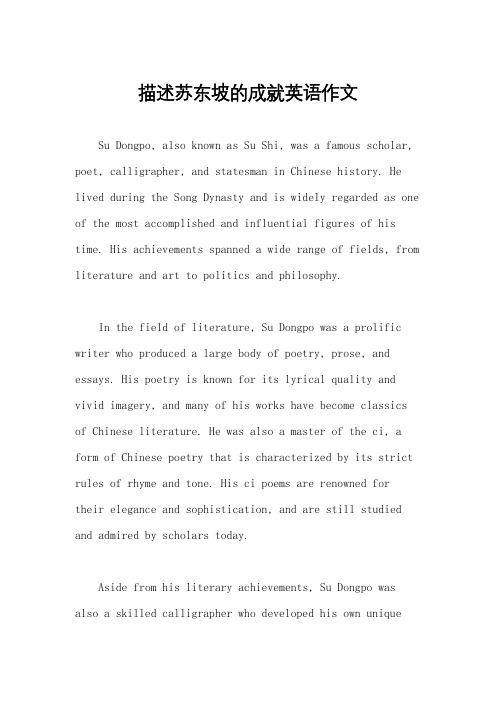
描述苏东坡的成就英语作文Su Dongpo, also known as Su Shi, was a famous scholar, poet, calligrapher, and statesman in Chinese history. He lived during the Song Dynasty and is widely regarded as one of the most accomplished and influential figures of his time. His achievements spanned a wide range of fields, from literature and art to politics and philosophy.In the field of literature, Su Dongpo was a prolific writer who produced a large body of poetry, prose, and essays. His poetry is known for its lyrical quality and vivid imagery, and many of his works have become classics of Chinese literature. He was also a master of the ci, a form of Chinese poetry that is characterized by its strict rules of rhyme and tone. His ci poems are renowned fortheir elegance and sophistication, and are still studied and admired by scholars today.Aside from his literary achievements, Su Dongpo was also a skilled calligrapher who developed his own uniquestyle of writing. His calligraphy is known for its bold, expressive strokes and its ability to convey the meaning and spirit of the words he wrote. He was also a patron of the arts, and supported many talented artists and musicians during his lifetime.In addition to his artistic pursuits, Su Dongpo was also a prominent statesman who served in various government positions throughout his career. He was known for his integrity, his commitment to justice, and his ability to govern with compassion and wisdom. He was also a philosopher who wrote extensively on topics such as morality, ethics, and social justice.Despite his many achievements, Su Dongpo was not without his faults. He was known for his quick temper and his tendency to speak his mind, which often got him into trouble with those in power. He was also accused of corruption at various points in his career, although these charges were largely unfounded.In conclusion, Su Dongpo was a remarkable figure wholeft an indelible mark on Chinese history and culture. His achievements in literature, calligraphy, politics, and philosophy continue to inspire and influence people today, and his legacy remains an important part of China's cultural heritage.。
林语堂的《苏东坡传》英语
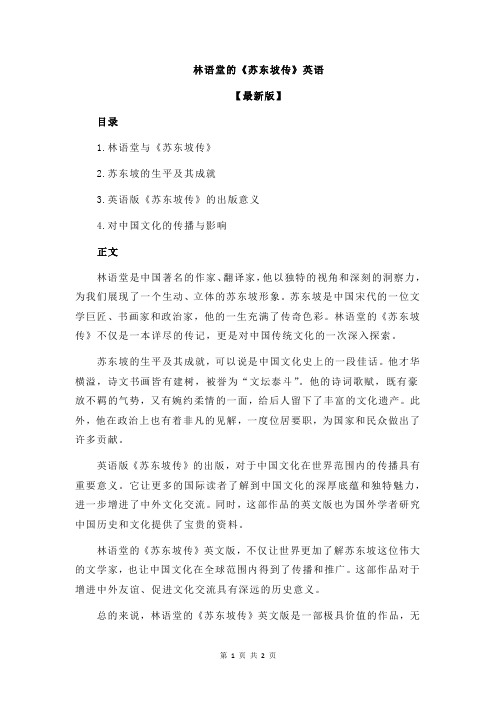
林语堂的《苏东坡传》英语
【最新版】
目录
1.林语堂与《苏东坡传》
2.苏东坡的生平及其成就
3.英语版《苏东坡传》的出版意义
4.对中国文化的传播与影响
正文
林语堂是中国著名的作家、翻译家,他以独特的视角和深刻的洞察力,为我们展现了一个生动、立体的苏东坡形象。
苏东坡是中国宋代的一位文学巨匠、书画家和政治家,他的一生充满了传奇色彩。
林语堂的《苏东坡传》不仅是一本详尽的传记,更是对中国传统文化的一次深入探索。
苏东坡的生平及其成就,可以说是中国文化史上的一段佳话。
他才华横溢,诗文书画皆有建树,被誉为“文坛泰斗”。
他的诗词歌赋,既有豪放不羁的气势,又有婉约柔情的一面,给后人留下了丰富的文化遗产。
此外,他在政治上也有着非凡的见解,一度位居要职,为国家和民众做出了许多贡献。
英语版《苏东坡传》的出版,对于中国文化在世界范围内的传播具有重要意义。
它让更多的国际读者了解到中国文化的深厚底蕴和独特魅力,进一步增进了中外文化交流。
同时,这部作品的英文版也为国外学者研究中国历史和文化提供了宝贵的资料。
林语堂的《苏东坡传》英文版,不仅让世界更加了解苏东坡这位伟大的文学家,也让中国文化在全球范围内得到了传播和推广。
这部作品对于增进中外友谊、促进文化交流具有深远的历史意义。
总的来说,林语堂的《苏东坡传》英文版是一部极具价值的作品,无
论是对于了解苏东坡的个人成就,还是对于研究中国历史文化,都具有重要的参考价值。
- 1、下载文档前请自行甄别文档内容的完整性,平台不提供额外的编辑、内容补充、找答案等附加服务。
- 2、"仅部分预览"的文档,不可在线预览部分如存在完整性等问题,可反馈申请退款(可完整预览的文档不适用该条件!)。
- 3、如文档侵犯您的权益,请联系客服反馈,我们会尽快为您处理(人工客服工作时间:9:00-18:30)。
练习· 8.苏东坡♦Su Shi (蘇軾) (1037-1101) was a writer, poet, artist, calligrapher and statesman of the Song Dynasty, one of the major poets of the Song era. His courtesy name(字)is Zidan (子瞻), self-titled(号)Dongpo Jushi(東坡居士, The one lived in Dongpo) and is often referred to as Su Dongpo (蘇東坡).♦Su Shi was born in Meishan, near mount Emei in what is now Sichuan province. His brother Su Che (蘇轍) and his father Su Xun (蘇洵) were both famous literati. In 1057, he and his brother passed the civil service examinations to attain the degree of jinshi, a prerequisite to holding high government office at that time.♦During the next twenty years, he held a variety of government positions throughout China, most notably in Hangzhou, where he was responsible for constructing a pedestrian causeway(堤道, 铺道)across the West Lake that still bears his name: su di (苏堤).♦He was often at odds(争执, 不一致)with a political faction headed by Wang Anshi. This faction's rise to power eventually resulted in Su Shi being exiled twice to remote places;first (1080-1084) to Huangzhou (now in Hubei province), and the second time (1094-1100) to Huizhou (now in Guangdong province) and Hainan island. In Huangzhou, he lived at a farm called Dongpo (the "Eastern Slope"), from which he took his literary name. He died in Changzhou, Jiangsu province.石钟山记苏轼♦《水经》云:“彭蠡之口有石钟山焉。
”郦元以为下临深潭,微风鼓浪,水石相捕,声如洪钟。
是说也,人常疑之。
今以钟磬置水中,虽大风浪不能鸣也,而况石乎!至唐李渤始访其遗踪,得双石于潭上,扣而聆之,南声函胡,北音清越,木包止响腾,余韵徐歇。
自以为得之矣。
然是说也,余尤疑之。
石之铿然有声者,所在皆是也,而此独以钟名,何哉?元丰七年六月丁丑,余自齐安舟行适临汝,而长子迈将赴饶之德兴尉,送之至湖口,因得观所谓石钟者。
寺僧使小童持斧,于乱石间择其一二扣之。
硿硿焉,余固笑而不信也。
新石钟山记石钟山《水经》云:“彭蠡之口有石钟山焉。
”郦元以为下临深潭,微风鼓浪,水石相捕,声如洪钟。
♦According to The Book of Waters, at the mouth of the Pengli Lake stands a hill named Stone Bell.♦Li Daoyuan explains in his annotation(注解,注释), “The base of the hill reaches a deep pond.♦Stirred by the breeze, the rippling of waves onto the stones sounds like the ringing of huge bells”.是说也,人常疑之。
今以钟磬置水中,虽大风浪不能鸣也,而况石乎!♦There has been a widespread skepticism about this view. Placed in the waters, a bell or a stone chime will never ring in the stormiest waves, let alone the hill-stones!至唐李渤始访其遗踪,得双石于潭(水边)上,扣而聆之,南声函胡,北音清越,余韵徐歇。
♦Li Bo in the Tang Dynasty was the first to explore the site. When he struck two stonesfrom the lakeshore, the one from the south hill sounded dull and muffled compared to the one from the north hill, which sounded clear and rich with a lasting resonation.自以为得之矣。
然是说也,余尤疑之。
♦He thought that he had ascertained the origin of this hill’s name. However, I have harbored more suspicion about this view.石之铿然有声者,所在皆是也,而此独以钟名,何哉?♦Since resounding stones can be found everywhere, why is this hill alone named “Bell”?元丰七年六月丁丑,余自齐安舟行适临汝,而长子迈将赴饶之德兴尉,送之至湖口,因得观所谓石钟者。
♦On the ninth day of the sixth month by the lunar calendar in the seventh year during the Yuanfeng reign (1084), I was taking a boat from Qi’an to Linru while my eldest son Su Mai was going to take office as the county magistrate in Dexing County, Rauzhou Prefecture. On my way to see him off to Hukou, I had the opportunity to see the “Stone Bell” hill.寺僧使小童持斧,于乱石间择其一二扣之。
硿硿焉,余固笑而不信也。
♦When the bonze/monk told a boy to strike at a couple of stones in the rubbles to emit thumping(砰然地响) sounds, I frankly laughed it away.善与恶The Good and the evil♦摘自2000年10月22日《经济参考报》♦苏东坡信仰佛教,对佛学颇有造诣.一次与方丈辩经,两人坐于团垫之上,相论许久。
方丈说:“我在对方的眼里是什么?”苏东坡说:“方丈你在我眼里是一堆牛屎。
”方丈微微一笑,说:“施主你在我眼里是一朵花。
”苏东坡满意而归,与小妹言及此事。
苏小妹说:“佛家有言,心在地狱缘恶念。
你心中有牛屎,才会把别人看成牛屎。
”苏东坡听罢,满脸愧色。
任何善恶的念头,在未变成行动和事实之前,其实在心中早已存在了。
心中充满恶念的人,看别人的眼光就会变异,而心中充满友谊、宽容的人,便会给别人和自己带来欢乐。
苏东坡信仰佛教,对佛学颇有造诣.♦苏东坡:苏东坡原名苏轼Sushi,不要按照别名翻译成Su Tung-po或Su Dongpo。
由于外国人不熟悉苏东坡其人,故此处最好略加说明(,who was a famous writer and calligrapher in the 11th century,)苏东坡信仰佛教,对佛学颇有造诣.♦信仰:believe in, be a believer in♦佛教:Buddhism♦佛学:Buddhist learning, Buddhist philosophy, Buddhist doctrine苏东坡信仰佛教,对佛学颇有造诣.♦颇有造诣:of great attainments♦b e well-versed in…参考译文♦1. Sushi, who was a famous writer,calligrapher and believer of Buddhism, was well-versed in the Buddhist philosophy.♦2. Sushi, a famous writer and calligrapher in the 11th century ,believed in Buddhism and was well-versed in its doctrine.一次与方丈辩经,两人坐于团垫之上,相论许久。
♦增补主语he, 时态可为一般过去时或过去进行时♦一次:once; one day♦方丈:Buddhist abbot, senior monk, head monk♦辩经:讨论经文discuss /debate over Buddhist Scriptures一次与方丈辩经,两人坐于团垫之上,相论许久。
♦团垫:a round cushion♦坐:不能单纯地译成sit,坐于团垫之上含有佛教风味,应处理成“打坐” sit / be seated cross-legged♦相论许久:互相谈论很久。
debate for a long time; had a long debate参考译文-1♦O nce he had (One day he was having) a debate with a Buddhist abbot over Buddhist Scriptures. The two of them sat cross-legged on a round cushion and debated for long hours.参考译文-2♦O nce he was discussing some passages in the Buddhist Scriptures with a Buddhist abbot.Both seated crossed-legged on a round cushion, they debated for a long time.方丈说:我在对方的眼里是什么?♦对方:你you; the other party♦在…的眼里:in the eyes of♦按照对话对待,故需要加引号。
